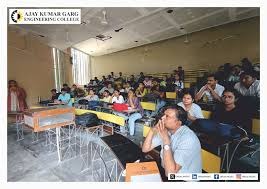 Image Source : Instagram
Image Source : Instagram
Ajay Kumar Garg Engineering College (AKGEC), Ghaziabad, has filedpatent application for an AI-powered waste management system designed to optimize recycling and reuse processes. The innovation reflects the institution’s growing emphasis on sustainable engineering and smart infrastructure solutions.
Technology Overview And Functional Scope
- The system uses artificial intelligence and IoT sensors to classify waste in real time based on material type, contamination level, and recyclability
- Machine learning algorithms enable predictive sorting and route optimization for waste collection vehicles
- The solution integrates with municipal dashboards to provide live data on waste volumes, segregation efficiency, and recycling rates
- It supports automated alerts for bin overflow, hazardous waste detection, and maintenance scheduling
- The system is designed to operate in both residential and industrial zones, with modular scalability for smart cities
Strategic Impact And Academic Context
- The patent aligns with AKGEC’s broader R&D focus on environmental technologies and smart urban systems
- It complements previous patents filed by the college in AI-based cloud security, IoT-enabled agriculture, and energy-efficient devices
- The project is expected to contribute to India’s Swachh Bharat and Smart Cities missions by enhancing waste traceability and resource recovery
- Faculty and students from the Department of Electronics and Computer Science collaborated on the design, with support from the college’s Centre of Excellence
Outlook
The AI-powered waste management system positions AKGEC as a frontrunner in academic-led sustainability innovation. The college plans to pilot the solution in Ghaziabad municipal zones by early 2026.
Sources: AKGEC Patent Registry, Indian Chemical News, AKGEC R&D Centre, Economic Times Education.
Advertisement
STORIES YOU MAY LIKE
 Image Source: MediaBrief
Image Source: MediaBrief
 Image Source: Talk Staff
Image Source: Talk Staff
 Image Source: Press Trust Of India
Image Source: Press Trust Of India
Key Highlights Kanpur district has kicked off Groundwater Awareness Week, which will last from July 16 through 22, as a collective effort to bring citizens, institutions, and government agencies together for improved water management. The initiative is an immediate response to local apprehensions of dwindling aquifers in the region and seeks to educate, motivate, and involve the community through practical conservation measures and awareness drives. Community-Based Engagement and Educational Activities District Magistrate Jitendra Pratap Singh pointed out that all the government departments, local educational institutions, colleges, and schools are involved in the observance. Various activities—workshops, seminars, quiz competitions, and field visits—are being organized to enhance public awareness about groundwater's vital role in daily life. The event's core message, "If water is safe then tomorrow is safe," resonates through school curricula and public exhibitions, with rainwater harvesting, recharge pits, rejuvenation of traditional ponds, and drip/sprinkler irrigation showcased as achievable solutions. Groundwater Conservation Successes and Solutions Kanpur's recent prosperity has its roots in a state-level commitment: over the past seven years, 34 development blocks in Uttar Pradesh have overcome long-standing water scarcity through composite interventions. Some of the key strategies include construction and rejuvenation of ponds for recharging aquifers, constructing check dams, and promoting water-conserving agriculture practices such as drip and sprinkler irrigation. Successful enforcement of the Uttar Pradesh Groundwater (Management and Regulation) Act 2019 has facilitated stricter regulation, monitoring, and sustainable extraction, with every district constituting a special Groundwater Management Council. Success stories like the Noon River revival—the revival of a historically significant 48-km river in Kanpur through a mix of community initiative, satellite mapping, afforestation, and pollution control—underscore the transforming potential of collaborative citizen and government effort. Jal Shakti Abhiyan and Statewide Momentum The Jal Shakti Abhiyan-VI, which was started in March 2025, also continues to complement these initiatives by focusing on people's involvement in water conservation, water body rejuvenation, and rainwater harvesting initiatives. Through years of collaborative efforts, Kanpur endeavors to stimulate behavior change at the grassroots level, guarantee future water security, and serve as a role model for other districts facing similar challenges. Sources: Times of India, Instagram, CGWB
Advertisement



